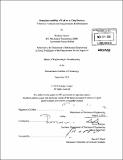Manufacturability of lab on a chip devices: tolerance analysis and requirements establishment
Author(s)
Linares, Rodrigo (Rodrigo Alfonso Linares Garcia)
DownloadFull printable version (8.894Mb)
Other Contributors
Massachusetts Institute of Technology. Dept. of Mechanical Engineering.
Advisor
Brian Anthony.
Terms of use
Metadata
Show full item recordAbstract
Decisions made during the first stages of the design process can have an impact on the cost, quality and performance of a product. Variation in assemblies, if not managed correctly during the design stage, can have a negative impact on the success of the product. This work analyzes the Daktari CD4+ Cell Counter System's capability of meeting its requirements. A Variation Simulation Model was employed to anticipate any failure modes caused by manufacturing variation and to test the robustness of the design. The design was shown to be largely successful in its ability to deliver function but unexpected failure mechanisms were found. Design considerations in the system KCs were suggested in order to minimize the effect of variation and reduce the risk of failure.
Description
Thesis (M. Eng.)--Massachusetts Institute of Technology, Dept. of Mechanical Engineering, 2010. Cataloged from PDF version of thesis. Includes bibliographical references (p. 64-66).
Date issued
2010Department
Massachusetts Institute of Technology. Department of Mechanical EngineeringPublisher
Massachusetts Institute of Technology
Keywords
Mechanical Engineering.